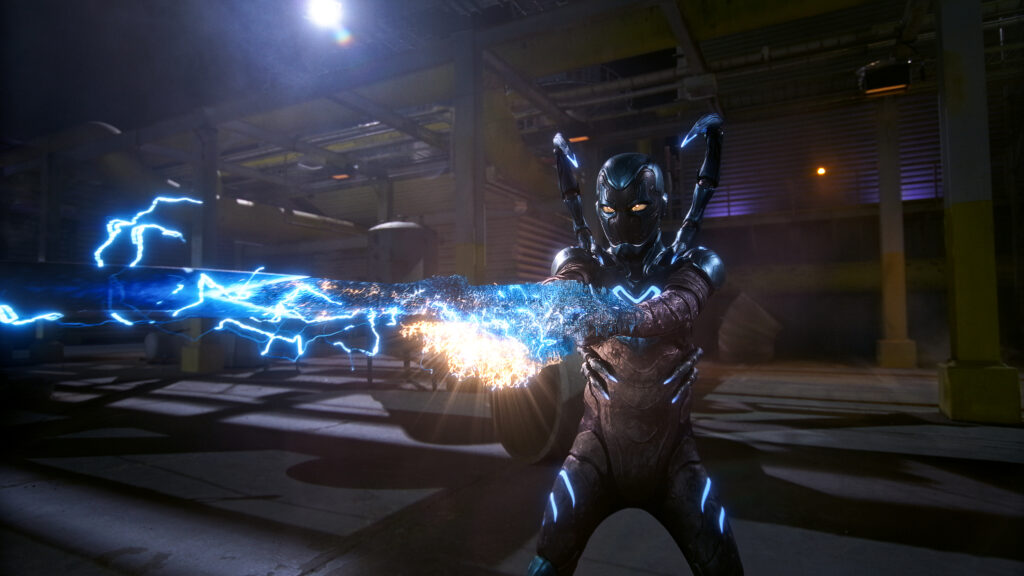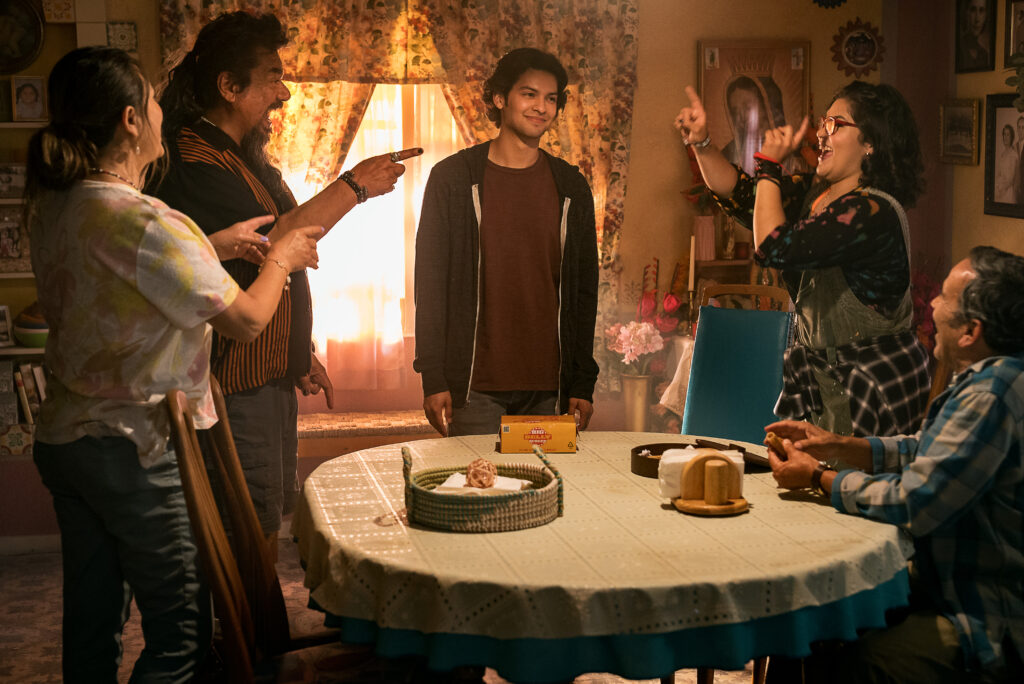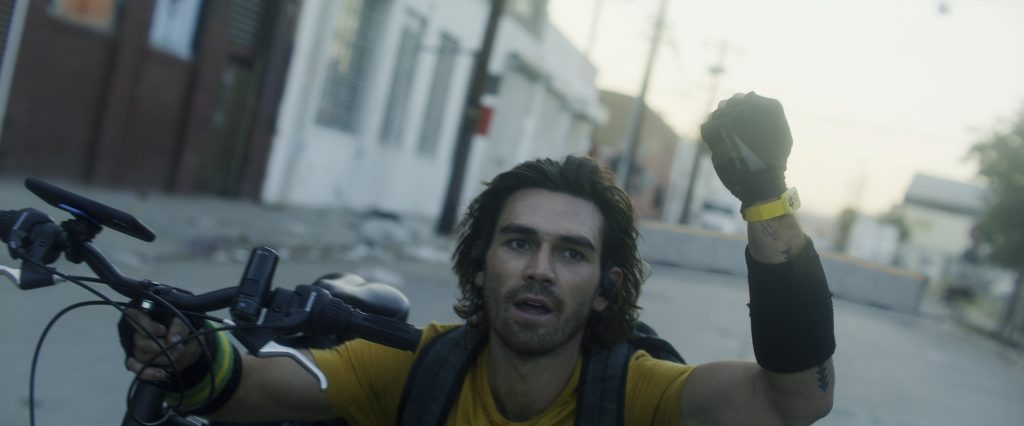August 16, 2023
by Carla Hay

Directed by Ángel Manuel Soto
Some language in Spanish with subtitles
Culture Representation: Taking place primarily in the fictional U.S. city of Palmera City, the sci-fi/fantasy/action film “Blue Beetle” (based on the DC Comics character) features a Latin and white cast of characters (with a few African Americans and Asians) representing the working-class, middle-class and wealthy.
Culture Clash: Recent college graduate Jaime Reyes has his body invaded by a super-powered beetle scarab, and he becomes the superhero Blue Beetle, battling his evil former boss who wants the scarab to create an oppressive army of robotic enforcers.
Culture Audience: “Blue Beetle” will appeal primarily to people who are fans of superhero movies, the film’s headliners and adventurous stories about underrepresented people who are the stories’ protagonists.

“Blue Beetle” sometimes gets trapped in a familiar superhero formula, but the movie’s comedic charm, rollicking style and authentic chemistry among the cast members are a winning combination. As an origin story, “Blue Beetle” won’t rank among the very best for superhero movies based on DC Comics, because there are a few too many superhero movie stereotypes in “Blue Beetle’s” action scenes. However, “Blue Beetle” has enough uniqueness and charisma in its characters that will give this movie a loyal fan base.
Directed by Ángel Manuel Soto and written by Gareth Dunnet-Alcocer, “Blue Beetle” tells the story of 22-year-old Jaime Reyes (played by Xolo Maridueña), an optimistic recent college graduate who has returned to his hometown of Palmera City, a fictional U.S. city based partially on El Paso Texas. DC Comics’ “Blue Beetle” stories have more than one person who is the character of Blue Beetle: archaeologist Dan Garrett (a character that debuted in 1939); inventor Ted Kord (debuted in 1966); and Jaime Reyes (debuted in 2006), a Mexican American who lives in El Paso.
In the “Blue Beetle” movie, Jaime (who is the first person in his family to graduate from college) has come back home to live in a family household that is going through some drastic changes. Jaime lives with his supportive parents Alberto Reyes (played by Damían Alcázar) and Rocio Reyes (played by Elpidia Carrillo); Alberto’s sassy mother Nana Reyes (played by Adriana Barraza); Jaime’s 17-year-old outspoken sister Milagro “Millie” Reyes (played by Belissa Escobedo); and Alberto’s eccentric brother Rudy Reyes (played by George Lopez).
Soon after arriving home, Jaime finds out that the family will be moving out of the house in the near future because the family can no longer afford the house rent, which has “tripled” due to gentrification. The family’s auto body shop is going out of business. Alberto is also recovering from a recent heart attack. Jaime is shocked to hear this news and asks why his family didn’t tell him sooner. They say it’s because they didn’t want anything to distract Jaime from his studies at school.
Jaime is hopeful that his college degree will help him get a job that pays enough to get the family out of these financial problems. He’s also hoping to go to law school someday. “I’ll get the money to save this place,” Jaime confidently tells Milagro. She isn’t so sure this goal will be as easy as Jaime thinks it will be. In the meantime, Jaime and Milagro work in sanitation and groundskeeping at Kord Industries, a massively successful technology corporation whose specialty is security.
The leader of Kord Industries is the ruthless and cruel Victoria Kord (played by Susan Sarandon), who took over the company after her brother Ted Kord disappeared. Ted inherited the company from his father. Victoria is still bitter and jealous that Ted got this inheritance. The opening scene of “Blue Beetle” shows Victoria and some of her minions discovering something near an asteroid that has fallen on Earth. Victoria gleefully says, “I’ve been looking for this for 15 years!”
Viewers later see that what they found is a blue beetle (about the size of a hand) called the Scarab, which has extraordinary powers and a mind of its own. Victoria wants the Scarab for a new Kord Industries invention: One Man Army Corps, a group of super-powered robots described as “the future of private policing.” Victoria’s brooding, hulking henchman named Conrad Carpax (played by Raoul Max Trujillo) is her most-trusted right-hand man to do her dirty work. Victoria’s leading scientist who works for her is Dr. Sanchez (played by Harvey Guillén), a long-suffering employee who experiences some of Victoria’s noticeable racism.
Not everyone is happy with Victoria’s plans for One Man Army Corps. Ted’s smart and independent daughter Jenny Kord (played by Bruna Marquezine), who is in her early 20s and is originally from Brazil, is the complete opposite of Victoria, when it comes to their outlooks on life. Jenny cares about humanity, the environment, and having socially responsible and ethical business practices. Jenny suspects but can’t prove that Victoria is behind her father Ted’s disappearance. (Jenny’s mother died years ago.)
Over the course of the movie, Jenny and Victoria clash in a number of ways. Anything that Victoria wants to do, Jenny wants to dismantle. Jenny isn’t afraid to openly defy her domineering aunt, who becomes infuriated and vengeful when she sees how far Jenny is willing to go to stop Victoria from Victoria’s nefarious plans. Early on in the movie, Victoria snarls to Jenny: “You are nothing to this company. You are a brat … Your father abandoned this company, and he abandoned me.
At first, Jaime is eager to impress Victoria. When Jaime sees Victoria on the company property, he tries to get her attention, but Victoria doesn’t even notice Jaime and other low-paid workers at the company. Milagro is with Jaime when he tries and fails to get Victoria’s attention. Milagro comments to Jaime: “We’re invisible to people like that.”
It isn’t long before Jaime and Jenny meet when Jenny is at Kord Industries headquarters. Jaime’s attraction to her is immediate. Jenny plays it cool, but it’s obvious that she will be Jaime’s love interest. Perpetually skeptical Milagro thinks that Jenny is out of Jaime’s league and tells Jaime, Milagro assumes that Jenny is just another spoiled rich kid who wouldn’t want to associate with people in the Reyes family. Through a series of events, Jaime will cross paths with Jenny until they both find out that they have a common goal.
Jaime and Milagro get fired after Jaime tries to defend Jenny during an argument between Jenny and Victoria. Later, Jenny (disguised as a Kord Industries lab worker) steals a security key card to gain entrance to the lab where the Scarab is being secretly kept. Jenny then takes the Scarab, which she knows Victoria needs to make the One Man Army Corps. However, Dr. Sanchez (who was not in the lab during this theft) comes back and sees the Scarab has been stolen and quickly gives a security breach alert.
The Kord Industries building goes on a security lockdown, but Jenny quickly gives the Scarab (which is in a box) to an unwitting Jaime, who is headed for the exit with other visitors, who have been told to evacuate the building. Jenny tells Jaime that what’s in the box is an important secret, and she warns him not to open the box. But, of course, as shown in the “Blue Beetle” trailers, Jaime opens the box when he’s at home with his family.
The Scarab enters Jaime’s body (painfully), and he becomes the Blue Beetle, a superhero with physical characteristics of a giant beetle and a blue superhero suit of armor. This transformation is shown in the “Blue Beetle” trailers, so there’s no mystery about it. After the Scarab melds with Jaime’s body, he can hear the voice of the Scarab as being an entity called Khaji-Da (voiced by Becky G), who gives Jaime/Blue Beetle advice on what to do when he’s in superhero mode.
The rest of “Blue Beetle” goes through a lot of over-used superhero movie motions of “we have to save the world from an evil villain.” However, thanks to engaging dialogue (some of it is hilarious, some of it is hokey) and a likable rapport between the Reyes family members, “Blue Beetle” can be very enjoyable to watch. It’s suspenseful and dramatic in all the right places.
Maridueña, who was previously best known for his supporting role as Miguel Diaz in Netflix’s “Cobra Kai” karate drama series, gives a star-making performance in “Blue Beetle.” He perfectly embodies Jaime’s amiable personality, which is a mixture of hopeful, curious and insecure about what he perceives as his shortcomings. Maridueña also adeptly handles the wide range of emotions that Jaime goes through in the movie.
It should come as no surprise that Lopez, who has a long history in comedy, gets the best and funniest lines in the movie as Uncle Rudy, who just happens to be an underappreciated tech whiz. Barraza as Jaime’s seemingly mild-mannered grandmother also has a few moments to shine in ways that aren’t too surprising, since the movie keeps dropping hints that there’s more to Nana Reyes than being a kind grandmother. Alcázar, who portrays the easygoing Alberto, has some well-acted heartfelt moments in scenes between Alberto and Jaime, who inherited is father’s positive attitude.
Victoria obviously represents corporate greed that’s out of control. Sarandon plays this villain role to the hilt, but Victoria might not impress some viewers who like superhero movies to have chief villains with superpowers. “Blue Beetle” also has some commentary and observations (but not preaching) about racism, such as a scene where Jaime goes to a Kord Industries reception area, because he has a meeting with Jenny, and the snooty receptionist (played by Brianna Lewis) automatically assumes that Jaime is a delivery person.
The visual effects in “Blue Beetle” are perfectly fine, but they’re not going to win major awards. Some of the action scenes are clumsily staged and could have been better, in terms of visual style and how events unfold in the screenplay. A mid-credits scene in “Blue Beetle” hints that a certain character will be in a “Blue Beetle” sequel, while the end-credits scene in “Blue Beetle” is a bit of fluff that has no bearing on any DC Comics movie. Overall, “Blue Beetle” is a solid superhero movie that doesn’t have a lot of originality in its “good versus evil” story, but the movie has appealing messages about family unity during tough times that can resonate with audiences of many different backgrounds.
Warner Bros. Pictures will release “Blue Beetle” in U.S. cinemas on August 18, 2023.




